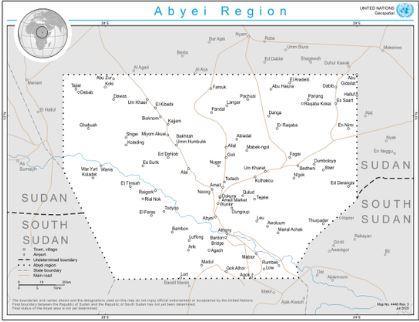The United Nations High Commission for Refugees (UNHCR) over the weekend donated 15 microphones, 8 pairs of gumboots, and 8 raincoats among others to the Abyei Administrative Area government to help disseminate health messages to flood-affected people.
Abuonweng Majid, the Abyei area minister of local government and law enforcement agencies who doubles as the chairperson of the Abyei crisis management team, said the items they received from UNHCR will improve information sharing with locals, government and NGOs as waterborne diseases increase in Abyei due to flooding.
“I received, as chairperson of the crisis management committee for Abyei, 15 microphones and other items from our partner, UNHCR, and they were distributed the same day (last Friday) to the four commissioners of Abyei Special Administrative Area (ASAA),” he said. “These items will be used to communicate how local communities should protect themselves from Hepatitis E which is found in dirty water and that the water should be boiled and be used later when it gets cold.”
Majid said Abyei is severely threatened by floods which displaced people from their homes, and contaminated drinking water sources, and that the people are suffering from diarrhea and worms among a spike in other waterborne diseases.
She urged the people to protect children, elderly people, and school-going children from contracting diseases and called on health partners to support the government in overcoming the crises.
For his part, Luar Mayol, the Mijak County commissioner, confirmed receipt of the items and said they have started to use them to disseminate health messages.
“The minister of local government is the head of the humanitarian emergency team in Abyei and received some few items brought by UNHCR and they are for the conveying the messages about poor health conditions caused by flooding in Abyei,” he explained. “Houses have collapsed and diseases, especially Hepatitis E, are spreading in Abyei and that is why there is a need to pass information to flood-affected communities on how to protect themselves from deep water locations and diseases.”
Mayol added: “I received two pairs of gumboots, microphones, torches, and raincoats among others to be used by two health educators in the villages to pass health messages during the wet season.”
In another development, the commissioner said the security situation in his county is stable but stated that floods are devastating the farms and houses. He added that the floods have closed the Agok, Amiet, and Athony road that connects Mijak County with neighboring areas and that this is hindering the movement of goods, services, and travelers.




